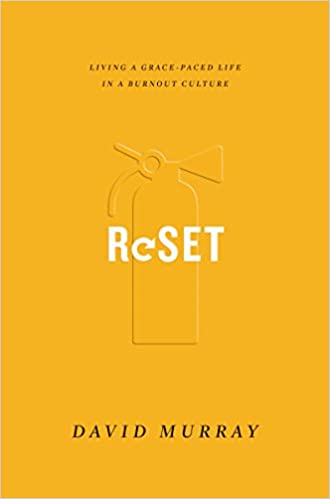I enjoy reading books because it helps me slow down and think. I recently came across “Reset: Living a Grace-Paced Life in a Burnout Culture” by David Murray that helped me to think more deeply about slowing down.

At the beginning of the book, Murray says, “Slow your pace or you’ll never finish the race.” The Bible calls believers to run the race (1 Cor. 9:24-27) and Murray addresses the problem of allowing the race to turn into burnout. He wrote this book primarily for those who are exhausted and weary in a culture of burnout. Although he writes primarily to Christian pastors and leaders, the principles of this book can be used by anyone who feels the effects of exhaustion. There is a funny illustration, but a little too true about life today. “Doing, doing, doing; producing, producing, producing; more, more, more; longer, longer, longer.”
Murray focuses on grace as the motivating factor for all of life. If grace does not motivate, then one will quickly feel burned out and joyless. He says that God has given different graces to help us on this busy journey. These graces include a weekly Sabbath, sufficient sleep, physical exercise, family and friends, and Christian fellowship.
There are ten chapters in the book called repair bays. This imagery made me think of taking my car into the shop and I see different cars in the repair bays. Some cars may need a brake job, others need an oil change, and others may need a whole new engine! Each of Murray’s repair bays starts out with the letter “r” as a helpful mnemonic device. I will highlight two repair bays in this review.
The first repair bay was the one called, “review.” He talked about reviewing all the different areas of life, beginning with our thinking. Many of the wrong things we hold onto are because of our wrong beliefs, fundamentally we forget that God is the creator, and we are his creation. One example is that we forget we are limited creatures and act like we have unlimited energy. We acknowledge truth on a surface level, but the way we live often contradicts that. He then helps the reader think about two categories that can be reviewed, the things that happen to us and the choices we make. We cannot control the things that happen to us (such as illness, loss, or evil) but we can control our response to those events. On the other hand, we make choices that lead us to the wrong place (such as debt, diet, or laziness). This helps one think about the question, “how did I get here?”
The second repair bay that I found helpful was the one on rest. He revealed how our understanding of sleep is theological. He begins with physical rest and ends with spiritual rest.
- Do we trust God when we are not active?
- Do we respect the need for sleep?
- Do we understand the body-soul connection?
- Do we demonstrate resting in Christ?
He develops a theology of sleep, revealing how sleep tells others what we believe about God. The very first point, “do we trust God when we are not active” reveals our belief in the sovereignty of God and the limitations God has given us (we need to sleep to survive). He talks about the consequences of sleep deprivation along with some practical remedies, such as simply sleeping more. He also aims for connecting rest with biblical realities. He makes the connections between sleep and faith: 1) it teaches about our Savior (Jesus rested), 2) it illustrates salvation (we come to Jesus for spiritual rest), and 3) it points us to heaven (one day we will have our final rest).
This book was very helpful to me, even when I did not want to acknowledge that he was right. One of my weaknesses is not thinking I need to rest, even though I acknowledge and fully agree with the body-soul connection and feel its effects. This book has some helpful tips on how to run the race better, not faster.